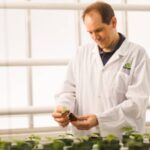Straw Pots
This year is shaping up to be a milestone for growers on the sustainability front. As retail chains, buyers and consumers request more eco-friendly and sustainable products and solutions from growers, nursery owners are looking for green solutions that are both cost- and production-efficient and can set them apart from the competition. As the myriad of green products and services grows, it can be challenging to wade through all of the information available and select the solutions that make sense — and make a difference to the environment.
One of the areas that has seen the most significant and rapid changes in recent years has been sustainable packaging. In the United States alone, more than a billion 1-gallon plastic pots are used each year; it takes 200 years for a plastic pot to break down. In an attempt to move away from environmentally unfriendly plastics and other materials, nursery suppliers have sought a huge variety of materials to make biodegradable, eco-friendly packaging. While there are certainly continuing strides to be made in eco-friendly packaging, Ivy Acres' StrawPot is a new product on the market that stands to make a difference, both for the environment and nursery owners.
An Accidental Discovery
The StrawPot is a biodegradable plant pot made of 100 percent natural ingredients: rice straw, coconut fiber and a natural latex adhesive. This product is the result of several years of research and development in the area of biodegradable plant pots. Ivy Acres has been using biodegradable pots for several years, but always with one eye on the horizon looking for improvements in the packaging. It has been a goal of Ivy Acres for many years to move away from plastic pots and find sustainable packaging solutions that would also be helpful to gardeners and the environment.
The beginning of the StrawPot was almost an accident. Several years ago, Ivy Acres' owner, Jack Van de Wetering, and his wife, Alice, were traveling in Sri Lanka and came across a company that manufactured straw mats, coconut fiber pots and other products from natural materials. As Van de Wetering further investigated the company's products, he asked whether it would be possible to make a biodegradable pot that would biodegrade in less than one year, allow roots to grow easily through the pot and benefit the environment in multiple ways.
The traditional coconut fiber pots were already in use at Ivy Acres, based in Baiting Hollow, N.Y., and Van de Wetering knew they did not fully meet the requirements he had of decomposing in less than one year. He wanted something better. When one of the manufacturing experts at the Sri Lankan company mentioned the vast availability of rice straw, Van de Wetering suspected they had hit upon a very promising solution.
The next few years were an exciting journey from theory to finished product for the StrawPot. Through a process of trial and error, Ivy Acres worked with the Sri Lankan company to test different combinations of straw, coco fiber and the latex adhesive. After testing several different ratios, developers found the right combination: 80 percent rice straw and 20 percent coco fiber with natural latex sprayed on. The rice straw and coco fibers are steam-cleaned and sterilized, then made into large roll sheets. It is then cut into sheets and molded into shape by hand using steam presses. The natural latex comes from the rubber plant; the plant's sap is collected like maple syrup and made into a spray that is applied after shaping.
The StrawPot is now being produced in various sizes at the facility in Sri Lanka and shipped to the Ivy Acres nursery in Baiting Hollow. A patent is pending.
A Competitive Advantage
When it comes to all biodegradable pots, most growers are still testing the waters to find the best pots for their production facilities and their customers. Eco-friendly plant pots are nothing new; other eco-friendly pots have been on the market for several years now. Ellepots and peat pots are the best-known biodegradable pots on the market. But in Ivy Acres' experience, none of the pots on the market offered the desirable results. When we looked at other eco-friendly ingredients for pots such as coconut fibers, chicken feathers, miscanthus grass, wood shavings and manure, we found them all lacking, despite their eco-friendly benefits. Some of the products Ivy Acres tried were the perfect example of what we call "the Goldilocks syndrome": One was too slimy and had an odd odor, one did not maintain its shape in larger sizes and one would not let the roots pass through. The StrawPot overcomes previous challenges by exceeding our expectations in several ways.
The big advantage of The StrawPot is its rapid degradation once planted. Most StrawPots biodegrade in three to six months. Once they are in the ground, they degrade quickly enough that roots can easily break through without manipulating the pot before planting, leaving nothing in the ground in a season or less. Traditional 100 percent coco fiber pots do not offer the same rapid degradation; in fact, in the course of our research, we discovered that coconut fibers are actually used to prevent soil erosion in some areas! Another eco-friendly material, elephant grass, has been used along with a natural starch to try to create biodegradable pots, but the pots were so strong from the starch that the bottom had to be physically punctured to allow roots to break through. The StrawPot offers the rapid degradation that allows roots to break through quickly.
Another advantage of the StrawPot is that it shows no signs of decomposing above ground. Because its material is porous, air circulates through the pot and prunes the roots of plants to the interior of the pot. However, once the StrawPot comes in contact with a soil rich in microbes, it begins to break down, and the plant's roots are able to break free of the pot. When decomposition is complete, the StrawPot aids in creating a soil-enriching compost right where it is most needed.
The manufacture of the StrawPot also offers environmental benefits in Sri Lanka, where growers produce millions of tons of rice straw as a byproduct of rice production every year. Normally, these vast amounts of rice straw are simply burned, a practice now banned in California. Using rice straw to manufacture new products keeps the environment of Sri Lanka clean.
As a cost measure, the StrawPot also can help growers manage space and turn plants faster. At Ivy Acres, we have had very good success with annuals. We can plant three 288-plug trays in one pot for best results and grow for three weeks before shipping, instead of six to seven weeks. We have found that the StrawPot actually enhances and accelerates the growth of the plants compared to growing in a plastic pot. In a plastic pot, roots are contained, but in the StrawPot, air can permeate the pot and prune the roots of the plants. The permeability slows down the process of breaking down the pot as well. In addition, the coconut fiber retains moisture and acts as a natural wetting agent. Peat moss and peat-based pots repel moisture. The ability to turn the greenhouse space faster will improve profitability in the long run.
Finally, as many retailers begin to request that growers follow green or eco-friendly guidelines, the StrawPot can be a valuable tool in getting those important certifications or approvals. And smaller growers who supply garden centers or sell directly to consumers can set themselves apart from growers who still use plastic pots or other slower-degrading pots by offering the StrawPot. Along with our Sri Lankan partners, Ivy Acres is keeping the end consumer in mind by making pots that are easy to handle — not too big or too deep to plant Ñand appeal to the end user.
Cornell University is currently testing the pot to confirm these benefits.
A Piece of the Puzzle
Because they degrade so efficiently, standard StrawPots are best used for plants with short growing seasons such as annuals and vegetables. However, plants with longer growing times such as perennials, shrubs and mums will benefit from reinforced StrawPots that last approximately two years.
StrawPots are available in a variety of shapes and sizes, from 31?2 inches to 2 gallons. They are currently available to wholesale growers nationwide. Ivy Acres is currently shipping about 10 percent of its products in StrawPots, and more than 40 growers across the country are shipping plants in StrawPots to align with Home Depot's sustainable guidelines.
The green-building and sustainability industry grows in leaps and bounds with each passing year. As growers look at all of the trends and options available now and try to decide which are best for their businesses, packaging options are just one piece of what can be a very large puzzle. The StrawPot offers growers a packaging solution that gives growers the benefits and business advantage they need to set themselves apart as innovative and eco-friendly.


 Video Library
Video Library 




















